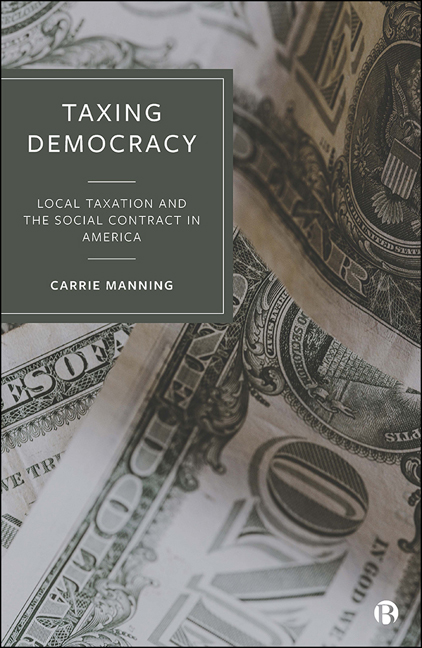Book contents
- Frontmatter
- Contents
- Acknowledgments
- 1 Taxes and the Social Contract
- 2 States, Taxes, and the Polities They Create
- 3 The US Tax State and the Limited Social Contract
- 4 Tax and Expenditure Limitations vs. an Expanding Social Contract
- 5 Implications of the Reliance on Fines and Fees
- 6 Taxing Democracy: Conclusions
- Notes
- References
- Index
1 - Taxes and the Social Contract
Published online by Cambridge University Press: 20 January 2024
- Frontmatter
- Contents
- Acknowledgments
- 1 Taxes and the Social Contract
- 2 States, Taxes, and the Polities They Create
- 3 The US Tax State and the Limited Social Contract
- 4 Tax and Expenditure Limitations vs. an Expanding Social Contract
- 5 Implications of the Reliance on Fines and Fees
- 6 Taxing Democracy: Conclusions
- Notes
- References
- Index
Summary
Introduction
On August 9 2014, police shot and killed Michael Brown, an 18-year-old resident of Ferguson, Missouri. Officer Darren Wilson, the police officer who shot Mr. Brown, said he believed Brown was a suspect in the robbery of a nearby convenience store. The officer maintained that he had fired in self-defense when Brown – unarmed – charged toward him as the officer sat in his police cruiser. Four months later, in November 2014, a federal grand jury declined to indict Officer Wilson, and a Department of Justice report later concluded that he had acted in self-defense. The killing, and the grand jury's decision not to indict, prompted days of protests and violent confrontations between protestors and police that attracted international media attention and helped propel the Black Lives Matter social movement to national prominence.
Ten days after Brown was killed, US Attorney General Eric Holder visited Ferguson and announced that the Department of Justice was opening an investigation into the incident. The report of the Department of Justice investigation, released in March 2015, amounted to a scathing indictment of Ferguson's police practices. The report found that:
Ferguson's law enforcement practices are shaped by the City's focus on revenue rather than by public safety needs. This emphasis on revenue has compromised the institutional character of Ferguson's police department, contributing to a pattern of unconstitutional policing, and has also shaped its municipal court, leading to procedures that raise due process concerns and inflict unnecessary harm on members of the Ferguson community. (US Department of Justice, 2015)
In his remarks announcing the release of the report, Holder affirmed that ‘this emphasis on revenue generation through policing has fostered unconstitutional practices – or practices that contribute to constitutional violations – at nearly every level of Ferguson's law enforcement system.’ He highlighted police targeting of Black citizens, particularly for minor offenses that carried monetary penalties.
In the city of Ferguson, the 53-member police force employed just three African American officers. The town relied heavily on policing to raise revenue. As the Department of Justice report put it, ‘City, police, and court officials for years have worked in concert to maximize revenue at every stage of the enforcement process.’
- Type
- Chapter
- Information
- Taxing DemocracyLocal Taxation and the Social Contract in America, pp. 1 - 15Publisher: Bristol University PressPrint publication year: 2023



